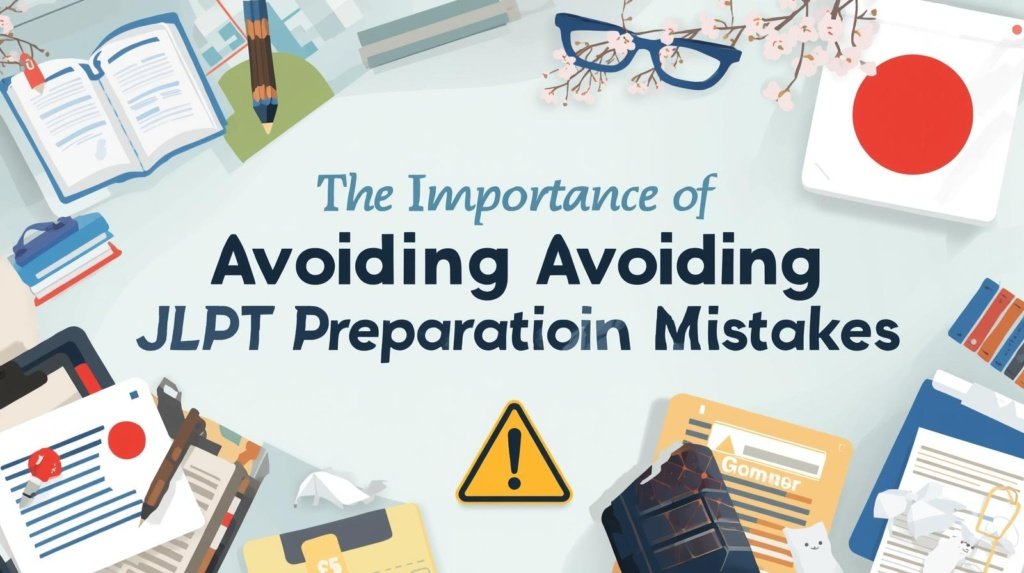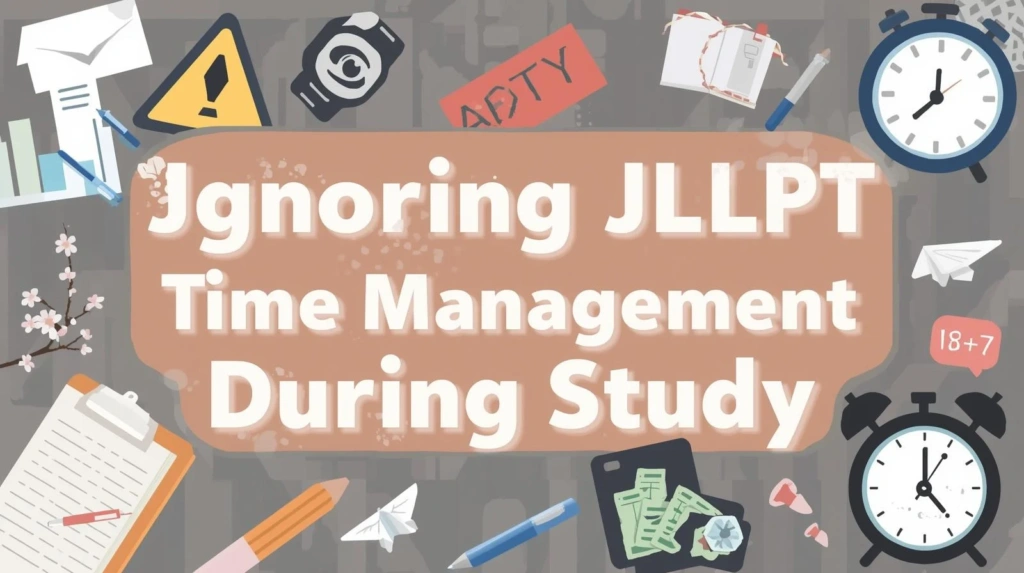Learning Japanese is more than just acquiring a new language—it can be an exciting and deeply rewarding journey that opens doors to higher education in Japan, career advancement, travel opportunities, and access to Japanese media and culture. For many learners, the Japanese Language Proficiency Test (JLPT) serves as a critical benchmark to measure proficiency and validate language skills. However, despite dedication and effort, a significant number of students encounter setbacks due to common errors in their preparation approach. These mistakes can range from focusing excessively on vocabulary while neglecting grammar and kanji, to poor time management, insufficient listening practice, and skipping past exam papers. Without recognizing and addressing these pitfalls, even motivated learners may struggle to reach their desired JLPT level.
In this comprehensive guide, we will examine the common mistakes to avoid in JLPT preparation, share practical JLPT preparation tips, and outline strategies for creating an effective, structured study plan. By understanding these errors and adopting a balanced approach, learners can optimize their preparation, improve retention, and increase their chances of success on exam day. JLPT Scoring System
The Importance of Avoiding JLPT Preparation Mistakes
Preparing for the JLPT requires consistent effort, strategy, and understanding of the exam structure. From N5 to N1, each level of the JLPT demands a different approach to grammar, vocabulary, reading, listening, and kanji. Unfortunately, many students struggle not because of lack of ability, but because of poor planning, over-reliance on certain materials, or ineffective study habits. Recognizing JLPT study mistakes early can save months of wasted effort and improve your confidence on exam day. JLPT or NAT

In this article, we will cover Japanese language learning errors, share strategies for avoiding JLPT grammar mistakes, explain the importance of JLPT time management, and provide guidance on building an effective JLPT study plan. By the end, you’ll have a clear roadmap to minimize errors and maximize your success.
Website: Team Language Services
Visit Us: 2/81-82, 2nd Floor, Lalita Park, Gali No – 2, Laxmi Nagar, New Delhi – 110092
Call Us: +91 8700956038
1. Starting Without a Structured JLPT Study Plan
One of the most significant common mistakes in JLPT preparation is starting study sessions without a clear, structured plan. Many learners begin by memorizing random vocabulary or grammar points without integrating reading, listening, or practice tests into their routine. This scattered approach leads to inefficient learning, gaps in knowledge, and difficulty achieving consistent progress across all exam sections. JLPT High Score Tips
Website: TILS School of Foreign Languages
Why it’s a mistake:
Without a structured study plan, your preparation can become chaotic, leading to gaps in knowledge and inefficient use of time.
Solution:
- Create an effective JLPT study plan tailored to your target level.
- Divide your study sessions into sections: vocabulary, grammar, reading, listening, and kanji.
- Schedule daily and weekly goals, allowing time for review and mock tests.
2. Ignoring JLPT Time Management During Study
Another common mistake in JLPT preparation is neglecting time management. While many students can answer questions correctly during practice, they often struggle to complete the exam within the allotted time. Poor pacing can lead to rushed answers or skipped questions. Practicing under timed conditions and developing a clear strategy for each section helps improve efficiency and ensures all questions are addressed accurately.

Website: Japanese Language Delh
Tips to improve time management:
- Practice with timed mock exams to simulate real test conditions.
- Learn to prioritize easier questions first to maximize your score.
- Allocate specific time for each section: listening, grammar, reading comprehension, and kanji.
Time management isn’t just about finishing the test—it’s about ensuring you can answer questions with confidence and accuracy under pressure. JLPT Registration Process 2025
3. Overlooking Grammar and Kanji Basics
Avoiding JLPT grammar mistakes is crucial for exam success. Many learners concentrate only on vocabulary or reading practice while neglecting essential grammar and kanji fundamentals. This imbalance can lead to misunderstandings in sentence structure and incorrect answers on the exam. A well-rounded study plan that combines grammar, kanji, and vocabulary ensures stronger comprehension and higher overall performance.
Website: Japanese Language Courses
Common issues:
- Confusing particle usage (は vs が, を vs に)
- Misunderstanding verb forms (te-form, potential, causative)
- Weak kanji recognition and writing skills
How to correct this:
- Dedicate daily practice to grammar drills and kanji flashcards.
- Use JLPT N5 to N1 preparation guides that clearly categorize grammar points.
- Combine grammar study with sentence creation to reinforce learning.
4. Focusing Too Much on Vocabulary Only
Vocabulary is essential for JLPT success, but overemphasizing it can become a preparation pitfall. Many learners spend hours memorizing words in isolation without practicing their use in context, sentence construction, or reading comprehension. This approach limits understanding and retention. To succeed, it’s important to integrate vocabulary practice with grammar exercises, reading passages, and practical application in writing or speaking. JLPT Exam Dates 2025
Website: Japanese Languages
Tips to balance vocabulary learning:
- Learn vocabulary in context by reading Japanese articles or sentences.
- Incorporate new words into your daily speaking or writing practice.
- Regularly revise old vocabulary to strengthen retention.
Remember, knowing words isn’t enough—you must understand how to use them in grammar and context to pass the JLPT.
5. Neglecting Listening Practice
Many learners mistakenly believe that mastering grammar and reading skills alone is enough for the JLPT, often neglecting listening practice. However, the listening section can be particularly challenging, especially at N3 to N1 levels, where fast speech, varied accents, and complex sentence structures are tested. Consistent listening exercises, including JLPT audio materials and real-life Japanese media, are essential for improving comprehension, timing, and overall exam performance.
Website: Study Japanese Language
Strategies to improve listening:
- Listen to Japanese podcasts, news, or JLPT audio materials daily.
- Repeat sentences aloud to improve pronunciation and comprehension.
- Take listening practice tests to get accustomed to speed and accent variations.
A strong listening ability will boost your confidence and significantly improve your overall score.
6. Not Practicing Previous JLPT Exam Papers
Skipping practice with previous JLPT question papers is a common and costly study mistake. Past papers provide valuable insights into question types, difficulty levels, and common traps, helping learners understand what to expect in the actual exam. Regular practice allows you to identify weak areas, improve time management, and build confidence. Incorporating past exams into your study routine ensures a more strategic, effective, and focused preparation for success.
Website: Japanese Language Institute
How to practice effectively:
- Start with past exams at your target level and gradually increase difficulty.
- Analyze mistakes to understand patterns and weak areas.
- Simulate real exam conditions for timing and focus.
7. Overloading Study Sessions
Studying excessively in a single session or cramming before the JLPT is a frequent preparation mistake. Long, unstructured study periods can cause mental fatigue and burnout, reducing focus and retention of important grammar, vocabulary, and kanji. Instead of overloading, learners should adopt shorter, focused study sessions with regular breaks, use structured revision schedules, and incorporate practice exercises. This approach enhances memory, maintains motivation, and improves overall exam performance.
Website: Japanese Language Coaching
Better approach:
- Break study time into shorter, focused sessions (Pomodoro technique works well).
- Prioritize quality over quantity, focusing on areas that need improvement.
- Include short review periods to consolidate learning.
8. Ignoring Weak Areas
Many students tend to focus on topics they are already comfortable with while avoiding more challenging areas. This selective approach often results in uneven preparation, leaving critical weaknesses unaddressed. Over time, these gaps can significantly impact exam performance, particularly in sections that require comprehensive knowledge, such as grammar, kanji, or reading comprehension. To achieve success in the JLPT, it’s essential to confront difficult topics, allocate extra time to weaker areas, and maintain balanced study habits.
Website: Study International Language
Solution:
- Identify weak areas from practice tests and drills.
- Allocate extra study time to grammar points, kanji, or listening exercises you struggle with.
- Track progress to ensure consistent improvement in all sections.
9. Failing to Set Realistic Goals
One common JLPT study mistake is setting unrealistic expectations, such as aiming to master N1 in just a few months. Such goals can create unnecessary stress, lead to burnout, and diminish motivation. Language learning is gradual, requiring consistent practice and patience. Overestimating your progress often results in frustration, making it harder to stay committed and effectively retain vocabulary, grammar, and comprehension skills.
Tip:
- Set achievable, incremental goals (e.g., N5 → N4 → N3).
- Focus on daily, weekly, and monthly milestones.
- Celebrate small victories to stay motivated.
10. Relying Only on Textbooks
Textbooks provide a solid foundation, but relying exclusively on them can limit exposure to natural Japanese used in everyday contexts. Many Japanese language learning errors occur when learners avoid practical application, such as speaking, listening, or reading authentic materials. To truly master the language and perform well in the JLPT, it’s essential to combine textbook study with real-world practice, including media consumption, conversation practice, and interactive exercises that reinforce comprehension and fluency.
Website: Study Online Japanese
Effective alternatives:
- Engage with Japanese media (anime, dramas, news) for listening and comprehension practice.
- Use language apps for interactive learning.
- Join language exchange programs or practice speaking with peers.
11. Lack of Review and Revision
Skipping regular review sessions is a significant mistake in JLPT exam strategy. Without consistent revision, previously learned material—such as grammar rules, vocabulary, and kanji—can fade from memory, reducing comprehension and accuracy during the exam. Many learners focus only on new content, neglecting what they’ve already studied. Incorporating scheduled review sessions ensures retention, reinforces learning, and helps identify weak areas, ultimately improving performance and confidence on test day.
Revision strategies:
- Weekly review of vocabulary and grammar points.
- Summarize key points in notebooks or flashcards.
- Periodically retake practice tests to monitor retention.
12. Not Understanding Question Patterns
Many learners overlook the importance of analyzing JLPT question structures, which often leads to careless errors during practice and the actual exam. Each section of the JLPT—whether it’s multiple-choice, reading comprehension, grammar usage, or listening comprehension—follows specific patterns that can be anticipated with proper practice. Understanding these patterns helps learners approach questions strategically, reduces mistakes, improves time management, and builds confidence in tackling even the most challenging exam sections effectively.
Solution:
- Study question formats for your target JLPT level.
- Practice answering under exam-like conditions.
- Focus on interpreting instructions carefully to avoid careless errors.
13. Common Errors in JLPT Practice Tests
Many learners make avoidable mistakes in JLPT practice tests, including misreading questions under time pressure, confusing similar-looking kanji, and overthinking simple grammar rules. Others fail to pace themselves, spending too long on difficult questions while rushing easier ones. Skipping review of incorrect answers is another common error. Consistently analyzing mistakes and practicing under timed conditions helps improve accuracy and exam confidence.
Common errors in JLPT practice tests often include:
- Misreading questions under time pressure.
- Choosing similar-looking kanji incorrectly.
- Overthinking simple grammar rules.
Tips to reduce mistakes:
- Analyze your practice test results carefully.
- Note recurring errors and create a targeted study plan.
- Practice with timed tests to improve accuracy and speed.
14. Failing to Adjust Study Plan for Higher Levels
Preparation for N5 to N1 differs significantly. A one-size-fits-all approach can hinder progress for advanced learners.
Recommendation:
- Update your effective JLPT study plan as you advance.
- Incorporate more reading comprehension and listening practice for higher levels.
- Prioritize kanji, grammar, and vocabulary relevant to your target JLPT level.
FAQ – Common Questions About JLPT Preparation
1. What are the most common mistakes students make during JLPT preparation?
Many students preparing for the JLPT fall into predictable traps that can significantly hinder their progress. One of the biggest mistakes is focusing too heavily on vocabulary while neglecting other essential areas like grammar, kanji, reading comprehension, and listening. For example, you might know hundreds of words but struggle to form correct sentences or understand reading passages due to weak grammar.
Another frequent mistake is starting preparation without a structured study plan. Without clear goals and a timeline, learners often end up studying randomly, revisiting familiar topics while ignoring weak areas. Additionally, many learners underestimate the importance of time management, resulting in slow progress and incomplete practice during mock tests.
Some students also fail to revise consistently, thinking that once a topic is studied, it will be retained automatically. Unfortunately, memory fades without reinforcement. Avoiding these errors early is critical for building a strong foundation and boosting exam confidence.
2. How can I avoid wasting time while studying for the JLPT?
Time management is crucial in JLPT preparation. Wasting time usually happens when learners study in an unstructured manner, focus excessively on easier or more enjoyable sections, or spend hours memorizing words without applying them. To maximize study efficiency, create a well-structured study plan that covers all aspects of the exam: grammar, vocabulary, kanji, reading comprehension, and listening.
Break your plan into daily, weekly, and monthly goals, and prioritize weak areas. For instance, if kanji is your weakness, dedicate specific sessions to learning and revising it regularly. Additionally, practicing past JLPT exam papers under timed conditions helps simulate the real test environment, allowing you to track your progress and adjust your strategy effectively.
3. Why do many learners fail the JLPT exam?
Failure in the JLPT is rarely due to lack of intelligence; it often stems from ineffective study strategies. Common reasons include:
- Poor time management: Spending too long on difficult questions and rushing through easier ones.
- Inconsistent practice: Skipping study days or cramming at the last minute instead of steady preparation.
- Overemphasis on one section: For example, memorizing vocabulary extensively while neglecting listening practice.
- Neglecting revision: Failing to revisit previously studied topics, resulting in forgotten grammar, vocabulary, and kanji.
Many learners also underestimate the importance of listening and reading comprehension, which can make or break performance in higher JLPT levels. Consistent, balanced, and structured preparation is the key to avoiding these pitfalls.
4. What should I focus on first when preparing for the JLPT?
When starting JLPT preparation, it’s essential to build a strong foundation before moving on to advanced topics. Beginners should focus first on grammar and basic kanji, as these form the core of sentence structure and reading comprehension. Without a clear understanding of grammar, it’s difficult to interpret sentences or use vocabulary correctly.
Once grammar and kanji foundations are in place, integrate vocabulary practice, listening exercises, and reading comprehension. This phased approach ensures that you learn effectively and avoid confusion. For example, learning new words without understanding their grammatical usage may lead to mistakes in sentence formation and reading exercises.
5. How important is vocabulary for passing the JLPT?
Vocabulary is an integral part of all JLPT levels and directly impacts your ability to comprehend reading passages, answer listening questions, and understand grammar contexts. However, memorizing words in isolation is not sufficient.
To retain vocabulary effectively:
- Learn words in context, using example sentences or passages.
- Regularly revise and test yourself with flashcards or apps.
- Apply new words in writing or speaking practice to strengthen memory.
Learning vocabulary contextually helps you understand nuances, idiomatic expressions, and proper usage, which are crucial for achieving a high JLPT score.
6. Should I practice previous JLPT question papers?
Yes, practicing past papers is one of the most effective strategies for JLPT preparation. Past exams help you:
- Understand question patterns and the types of grammar, vocabulary, and kanji tested.
- Develop time management skills, learning how long to spend on each section.
- Identify weak areas, allowing focused study on topics you struggle with.
For best results, simulate exam conditions by timing yourself and minimizing distractions. After completing a paper, carefully review all mistakes and take note of repeated errors to prevent them in future practice.
7. How can I improve my JLPT listening skills effectively?
Listening is often a challenging section, particularly at higher levels (N3 to N1). Many students neglect it, assuming grammar and reading are more important. To improve listening:
- Listen daily to Japanese audio, such as podcasts, news, anime, or language-learning apps.
- Repeat sentences aloud to improve both comprehension and pronunciation.
- Use JLPT listening practice tests to familiarize yourself with the pace, intonation, and types of questions.
- Focus on identifying keywords and contextual cues to understand overall meaning.
Consistent listening practice strengthens your ear for Japanese, reduces anxiety during the exam, and increases your ability to comprehend spoken Japanese in real situations.
8. Is grammar more important than kanji in JLPT preparation?
Grammar and kanji are both essential, but they serve different purposes. Grammar provides the rules for constructing and interpreting sentences, helping you understand reading passages and apply vocabulary correctly. Kanji recognition, on the other hand, is critical for quickly reading text and identifying word meanings.
To succeed, balance your preparation:
- Practice grammar through exercises, drills, and sentence construction.
- Strengthen kanji knowledge using flashcards, writing practice, and recognition exercises.
- Combine grammar and kanji practice in reading and listening contexts for more effective learning.
Neglecting either can result in misunderstandings or slow performance during the exam.
9. What are the best study habits to avoid JLPT preparation mistakes?
Developing good study habits can help you avoid common preparation mistakes. Recommended practices include:
- Set realistic goals based on your current proficiency and target JLPT level.
- Study consistently, ideally every day or on a fixed schedule, instead of cramming.
- Regularly review grammar, vocabulary, and kanji to reinforce memory.
- Practice past papers under timed conditions to simulate the exam environment.
- Focus on weak areas, spending extra time on challenging grammar points, kanji, or listening exercises.
By adopting these habits, you’ll reduce errors, increase efficiency, and improve confidence for the actual exam.
10. How early should I start preparing for the JLPT exam?
The optimal preparation time varies depending on your starting level and target JLPT level. Beginners often require 6–12 months to build a strong foundation, while intermediate learners may need 3–6 months for focused study.
Early preparation allows you to:
- Pace learning without stress.
- Review and revise difficult topics multiple times.
- Complete several full-length practice tests to build confidence.
For higher levels like N2 and N1, starting early is especially important because advanced grammar, extensive vocabulary, kanji knowledge, and reading/listening comprehension all require consistent, long-term study.
Conclusion: Avoiding Mistakes to Maximize JLPT Success
Avoiding common mistakes in JLPT preparation is key to passing the exam efficiently and confidently. A structured plan, consistent practice, time management, and careful revision will help you overcome most challenges. Remember, it’s not just about studying hard—it’s about studying smart.
For personalized guidance, TLS – The Japanese Language School offers expert support for all JLPT levels, from N5 to N1, including structured courses, practice materials, and exam strategies. Start your journey today and avoid the pitfalls that many learners face.Contact TLS – The Japanese Language School
+91 8700956038
✉ tls@teamlanguages.com



